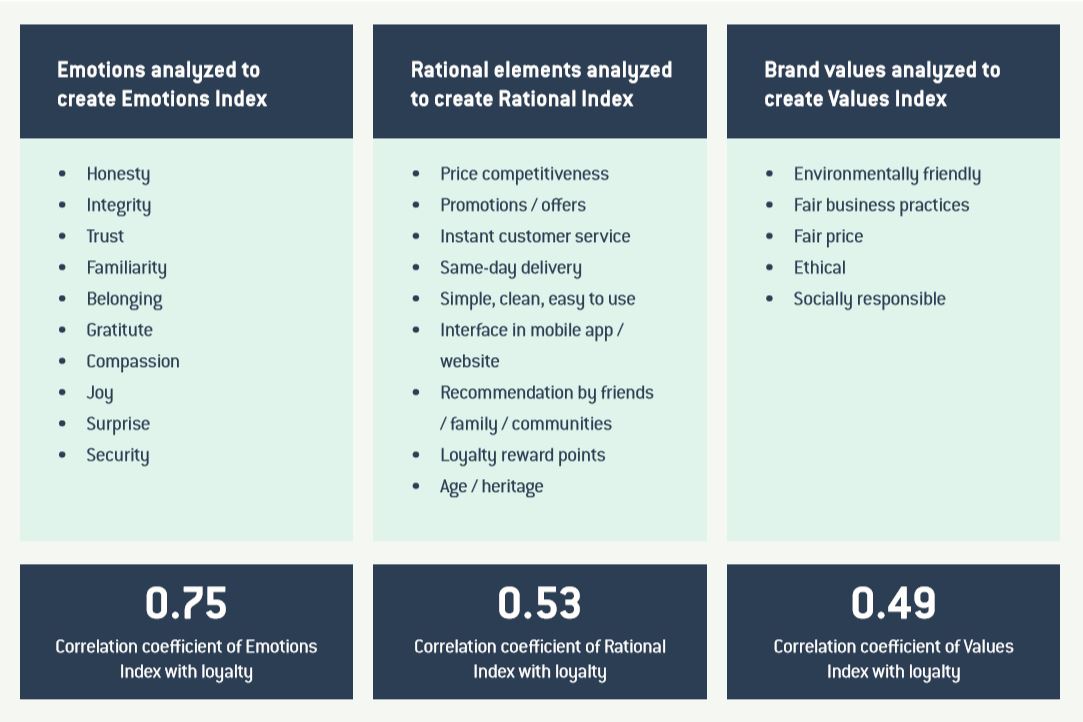
Why an emotional connection matters in loyalty
Brands need to know and understand what motivates loyalty from their customers. Numerous research studies have identified three main classifications of loyalty, they are:
- Behavioral loyalty which is when the customer shops with a brand because it’s convenient. Their loyalty is driven by habit rather than a genuine connection to the brand.
- Rational loyalty which is when customers shop with a particular brand because of price, for example, but will switch to another brand if they can find a more affordable option.
- Emotional loyalty which means customers are emotionally engaged, feel delighted by the brand, and would advocate and recommend the brand to their friends and family. These customers will spend with a brand no matter what.
THE VALUE OF EMOTIONALLY CONNECTED CUSTOMERS
Research from Forrester concludes that emotion is the biggest driver of loyalty in many industries. A study by CapGemini found that there are significant brand benefits to nurturing a relationship with emotionally invested customers.
Emotionally loyal customers spend more. According to the research, 70% of emotionally engaged consumers spend up to two times or more on brands they are loyal to, compared to less than half (49%) of consumers with low emotional engagement. Brands that engage customers meaningfully in ways that illicit customer emotion have the potential to increase basket size, purchase frequency, and gain significant profit. The research finds that emotional engagement with consumers could drive a 5% uplift in annual revenue.
Emotionally loyal customers have their favorite brand top of mind. The research finds that 86% of consumers with high emotional engagement say they always think of the brands they are loyal to when they need something, and 82% always buy from the brand when they need something. This compares to 56% and 38% of consumers with low emotional engagement. Brands that are able to establish an emotional relationship with customers are able to beat out the competition and maintain significant wallet share from their customers.
Emotionally loyal customers will promote their favorite brands. The research finds that 80% of emotionally engaged consumers will promote brands they are loyal to among their family and friends compared to 50% of the less engaged. By focusing on emotional relationship building brands are able to increase wallet share and turn their best customers into their biggest advocates.
“When people are financially invested, they want a return. When people are emotionally invested, they want to contribute.”
Simon Sinek
EMOTIONS INDEX
Emotional Loyalty occurs when a customer feels connected to the brand, and is willing to overcome barriers that he/she otherwise would not. This is demonstrated by both how the customer acts (behaviour) and how the customer feels (attitude) about the brand. Researchers from Capgemini surveyed over 9,000 consumers and 500 executives & leading neuroscientists in the field. To examine both emotional and rational needs, they developed 3 indices, examining the impact of emotional factors, rational factors, and brand values on loyalty levels:
- Emotions Index: Emotions consumers feel when they think about the brands they use or visit frequently
- Rational Index: Consumers’ views on the importance of rational factors when deciding which brands they will be loyal to
- Values Index: Consumers’ views on the importance of brand values when deciding which brands they will be loyal to

The higher the score in an index, the greater its influence on loyalty. The study proves that the Emotions Index has the strongest correlation with loyalty behaviour. In other words, marketers can use emotions to influence the decision-making part of the brain.
HOW TO DRIVE EMOTIONAL CONNECTIONS
How can loyalty programs today engage customers in the ways the build emotional loyalty? Martin Mehalchin Partner at the marketing and sales strategy consulting firm, Lenati, says, “Marketers have come to realize, and research has shown, that emotion is a key driver of the most profitable customer behavior, influencing customer spend, loyalty, advocacy and customer lifetime value. We encourage our clients to use empathy mapping and other design thinking techniques to identify and understand emotional drivers such as values, self-image and achievement of life goals and then target those drivers with their program strategy. This emphasis on emotional loyalty is behind the rise of programs that emphasize membership and access to experiences over a traditional points economy.”
Surprise & Delight. Brands that can demonstrate value to their customers beyond service and product offerings have the potential to form a deeper connection. One way brands are adding value and differentiating from the competition is by using surprise and delight tactics to show gratitude to their best customers. A simple gift, free product or exclusive promotion is a great way of extending thanks to a loyal customer. Through analysis of loyalty program trends and behaviors, brands can identify the best customers to target with surprise and delight.
Demonstrate relevancy. Customers want personalized experiences. In the State of the Connected Customer report by Salesforce 70% of consumers said a company’s understanding of their individual needs influences their loyalty, and 69% said the same of personalized customer care. Using data collected in a multichannel loyalty program, brands can engage customers in relevant, meaningful ways that create a positive experience.
Anticipate their needs. Just as customers expect a more personalized experience, they also expect brands will leverage the data they’ve shared to predict their next likely action with a brand. By 2020, 51% of consumers expect companies to anticipate their needs and make relevant suggestions. Brands can add value for customers by demonstrating they understand their needs and are committed to creating a better brand experience for them. Sophisticated loyalty program technology providers provide predictive modeling capabilities which captures customers’ contextual and behavioral data and models it to predict next-best-actions in their journey.
Create unique experiences. Customers want to be rewarded for their loyalty. From elite rankings to special events and unique experiences, it’s essential to offer one-of-a-kind rewards and experiences that make members feel special, valued, and appreciated.
Loyalty programs that offer exclusive/one-of-a-kind rewards such as an invitation to a VIP event help to make customers feel part of an exclusive community. Alternatively, offer early access to sales or limited-edition rewards to make customers feel appreciated and build greater emotional attachment to the brand.
Making investments in your loyalty initiatives to drive an emotional connection with customers will significantly increase customer value, grow spend and engagement, and even attract new customers to your brand.
May the loyalty be with you!









Greetings! I’ve been reading your weblog for a long time now and finally got the courage to go ahead and give you a shout out from Huffman Texas! Just wanted to mention keep up the great job!|